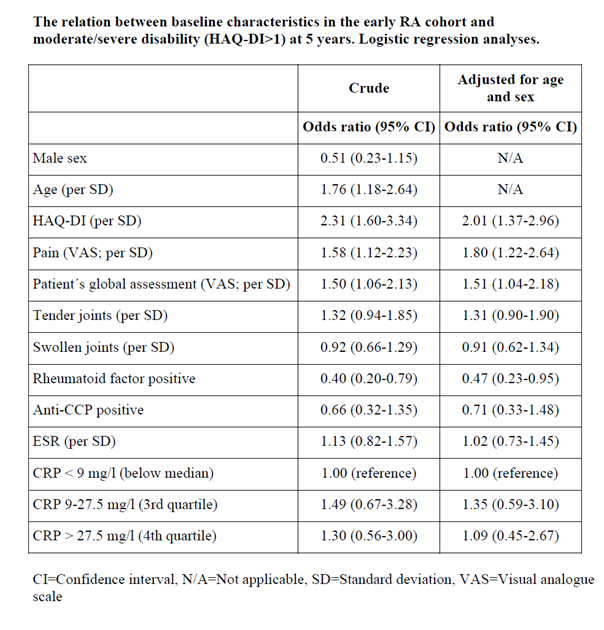Session Information
Date: Sunday, November 13, 2016
Title: Rheumatoid Arthritis – Clinical Aspects - Poster I: Clinical Characteristics/Presentation/Prognosis
Session Type: ACR Poster Session A
Session Time: 9:00AM-11:00AM
Background/Purpose: Patient reported outcome measures (PROMs), including the Health Assessment Questionnaire Disability Index (HAQ-DI), are valuable and reliable instruments for assessment of disease severity and disability in patient with early rheumatoid arthritis (RA), and have also been reported to have prognostic value. The aim of this study was to evaluate how disability varies over time in patients with early RA, and to identify early predictors of future disability in RA.
Methods: An inception cohort of patients with early RA (symptom duration ≤12 months), recruited in Malmö in 1995-2005, was followed in a structured program, including clinical evaluation and PROMs. Changes in HAQ-DI between different time points were assessed using the paired T-test. Potential predictors of moderate/severe disability (HAQ-DI >1.0) at 5 years were examined using logistic regression.
Results: A total of 233 patients (70 % women; mean age at diagnosis 60.5 years; 62 % RF positive; 57 % anti-CCP positive) were included. The median duration of symptoms at onset was 7 months. The median HAQ-DI score decreased from inclusion to 6 months (median 0.88 vs. 0.50; p<0.001), remained stable at 12 and 24 months, and then increased significantly again at 5 years (median 0.69; p=0.002 vs 24 months) and 10 years (median 0.75; p=0.004 vs 5 years). Baseline characteristics that predicted moderate to severe disability included high HAQ-DI scores [age-sex adjusted odds ratio (OR) 3.43 per unit; 95% confidence interval (CI) 1.88-6.27)] and high scores for pain and patient´s global assessment, but not laboratory markers of inflammation (Table). Patients with RF positive RA had a lower probability of a HAQ-DI >1 after five years (Table). Although RF negative patients were slightly older at diagnosis (mean 61.9 vs. 59.5 years) and had higher baseline HAQ scores (median 0.88 vs 0.75; p=0.09), there was a trend towards a negative association with 5-year moderate/severe disability also in analysis adjusted for age, sex and baseline HAQ-DI (OR 0.50; 95 % CI 0.23-1.07).
Conclusion: Disability decreased early in the disease course, and thereafter increased consistently from two years after diagnosis and onwards. The latter may be related to chronic joint damage and increasing age. Moderate to severe disability after 5 years was predicted by worse PROMs, but not by standard laboratory measures of disease activity. Patients with RF negative RA had worse disability, likely reflecting distinct factors influencing PROMs in this subgroup.
To cite this abstract in AMA style:
Hansson T, Book C, Jacobsson LTH, Turesson C. Disability in Early Rheumatoid Arthritis, Course and Predictors [abstract]. Arthritis Rheumatol. 2016; 68 (suppl 10). https://acrabstracts.org/abstract/disability-in-early-rheumatoid-arthritis-course-and-predictors/. Accessed .« Back to 2016 ACR/ARHP Annual Meeting
ACR Meeting Abstracts - https://acrabstracts.org/abstract/disability-in-early-rheumatoid-arthritis-course-and-predictors/

